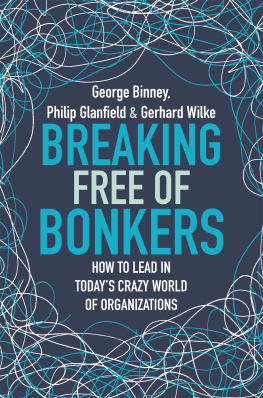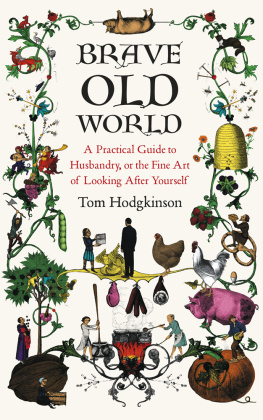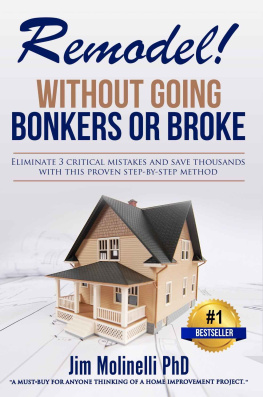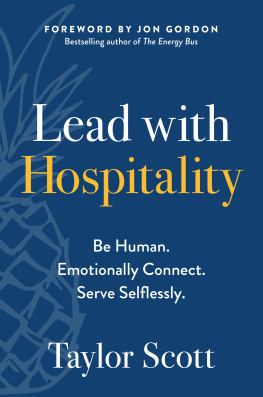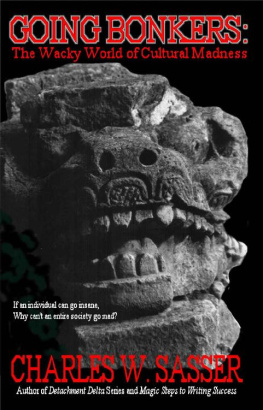Breaking Free of Bonkers
How to Lead in Todays Crazy World of Organizations
George Binney, Philip Glanfield, Gerhard Wilke
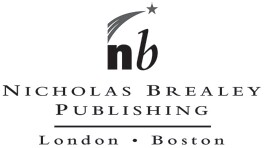
www.nicholasbrealey.com
First published in 2017 by Nicholas Brealey Publishing
An imprint of John Murray Press
An Hachette UK company
Copyright George Binney, Philip Glanfield, Gerhard Wilke 2017
The right of George Binney, Philip Glanfield and Gerhard Wilke to
be identified as the Authors of the Work has been asserted by them
in accordance with the Copyright, Designs and Patents Act 1988.
All rights reserved. No part of this publication may be reproduced,
stored in a retrieval system, or transmitted, in any form or by any
means without the prior written permission of the publisher, nor be
otherwise circulated in any form of binding or cover other than that
in which it is published and without a similar condition being
imposed on the subsequent purchaser.
A CIP catalogue record for this title is available from the British Library and the Library of Congress
Hardback ISBN 978-1-47366-907-9
Ebook ISBN (UK) 978-1-47367-059-4
Ebook ISBN (US) 978-1-47366-995-6
Nicholas Brealey Publishing
John Murray Press
Carmelite House
50 Victoria Embankment
London, EC4Y 0DZ, UK
Tel: 020 3122 6000
Nicholas Brealey Publishing
Hachette Book Group
Market Place Center, 53 State Street
Boston, MA 02109, USA
Tel: (617) 263 1834
www.nicholasbrealey.com
Contents
Introduction
Why This Book, and Why Now?
Bonkers is a provocative word. In our day-to-day conversation we use it with a shrug of the shoulders. We dismiss some aspect of the world as crazy or perverse and we are, at the same time, accepting that we cant change it. Bonkers is the way of the world...
The title of this book was prompted by a chief executive who, in a candid moment, told us that his job was to work with the bonkers to make sense of an insane world; to do a good job against the odds.
In our job as organization consultants, we have met many people, in many different fields, who are bewildered and oppressed by the apparent insanity of much of what goes on in organizations. There are seemingly endless reorganizations and restructurings. Leaders feel they need to disturb people and organizations. People are sometimes not sure what unit they are part of, or who their boss is. They seem to serve computer systems rather than the other way round, and spend inordinate amounts of time ticking boxes and preparing plans and policies that dont make a difference, as well as sitting in unproductive meetings. The time to do real work is squeezed, organizations are hollowed out; there are lots of controls but little trust. Culture is seen as a problem a barrier to much needed change and we are asked to put our faith in abstract ideas that bear little relationship to reality. There is so much that is bonkers. Maybe we need to take it more seriously.
The origins of bonkers
Our view is that a heroic orthodoxy embracing ideas of leadership, change and strategy has come to dominate organizational life since the Thatcher/Reagan revolution in the late 1970s and the 1980s. The orthodoxy is that, in a period of unprecedented upheaval, the job of leaders is to drive through change. The orthodoxy assumes that business knows best, and was promoted by many business schools and consultancies, used first in the private sector, and then extended to the public sector. The approach is credited with many of the remarkable achievements of modern organizations.
However, every way of seeing is also a way of not seeing. Every way of doing is a way of not doing. Many of the costs and frustrations of organizational life today stem from being tied to just one way of thinking about (and working with) organizations and people. The top-down managerial efforts at change that come with the orthodoxy, however well intentioned, keep producing unintended consequences.
The orthodoxy derives from a long-standing neo-liberal picture of society (a picture which is now being challenged by Brexit and Donald Trump as well as the Left). The neo-liberal view is that the best way to make sense of what humans do is an economists model. We are economic animals, who will respond to rational incentives, carrots and sticks. This is one, narrow version of liberalism, perverted into a kind of fundamentalism; a claim that there is only one truth in society the free market, choice and competition. Leaders, it is believed, must wrestle organizations into shape to fit this idealized model.
The heroic approach is all around us. It is so much the orthodoxy that many managers and leaders take it for granted. It is the sea we swim in and cannot see.
Faced by this orthodoxy and the bonkers it creates, we each have a choice about how to respond.
Do we keep our heads down and go into survival mode? Do we revolt? Or can we recover the capacity in our working lives to think, feel and act for ourselves? Thats the path we suggest in this book.
We offer our direct experience of people who work productively and lead well, despite the orthodoxy. They have broken free of bonkers. They know (often intuitively) from their experience what makes sense. We tell their stories and offer their insights, describing how:
| They recognize that good management is essential but effective leadership comes first. |
| They trust their own experience, feelings and intuition as much as their intellect. |
| They focus on connecting with the people around them and not just on the task. |
| They reach out to others and focus on we not I, recognizing that liberating the collective intelligence of groups and organizations is more important than any one persons contribution. |
| They work with the grain of what they have. They are respectful of what exists and what has gone before, and do not throw it all up in the air. |
| They see the potential in every situation and interaction to make a difference; they dont postpone effective action to some glittering future that never arrives. |
The alternatives to the heroic orthodoxy are not new. One of the aspects of current business and management culture that most disturbs us is the absence of a sense of history. We want to recover old wisdom, which we are all aware of at some level, going back to the Enlightenment and the Scientific Revolution and before.
It seems to us essential to restore some old insights. We are much more than rational, economic animals. We are social beings shaped by history and culture indeed, being rational is only rational if it takes this context into consideration, otherwise its bonkers!
Organizations are communities (not economists models or machines) which have grown up over a period of time and as a result of many influences; they are not the result of any overall design. They deserve respect. We need to start with curiosity about the specific history and context of each organization, and pay close attention to purpose, meaning and social attachment.
We argue that we should apply to business and organizations the same principles of pluralism that should apply (in liberal democratic countries) in society as a whole that there is no one answer to all problems and we should consider issues from a range of perspectives; that there should be checks and balances (and that no one person or group should have too much power); and that open debate and the free exchange of ideas and information are essential to progress.
Next page
